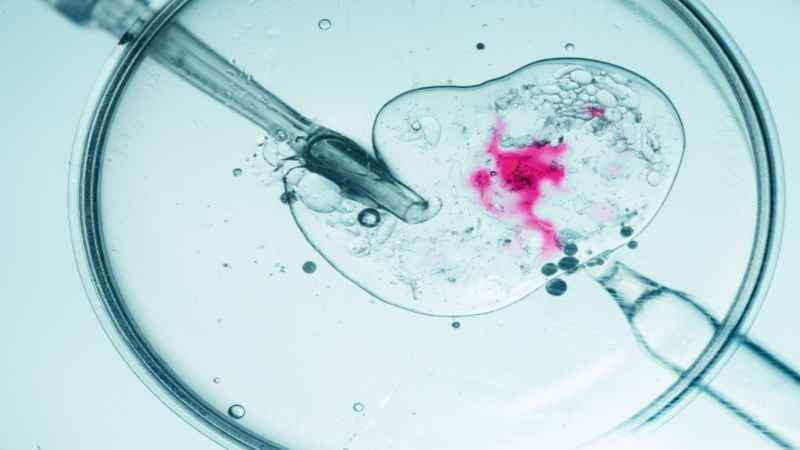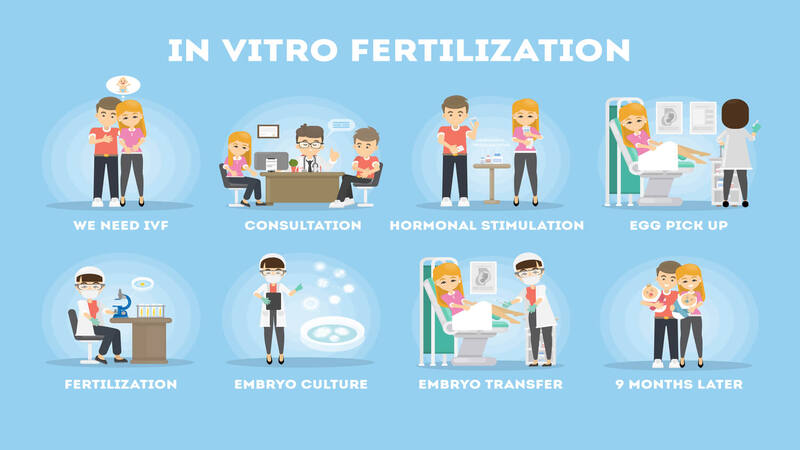
IVF was introduced in the 1970s and since then many changes have come and more advanced ART procedures have come into the picture to help infertile patients more accurately. IVF is the procedure where the embryo is made outside the body in an incubator and then put inside the uterus of the woman. (1)
In this article, we will discuss IVF procedures in detail, how to prepare patients before IVF, and how the procedure works.
What is IVF Treatment?

In vitro fertilization (IVF) or test tube baby treatment is the treatment done for those couples who are unable to conceive even after trying for several years by natural methods, by medicines or injections, or by failed IUI, PCOS (2).
In 1978, the first baby was born by IVF named Louis Brown. Since then till date, ART has helped many couples to achieve pregnancy. In recent times many couples have opted for IVF. (3)
How Does IVF Treatment Work?

IVF treatment helps couples who are unable to conceive on their own to achieve pregnancy. In this procedure, the woman’s eggs are collected after stimulation, and the husband provides a sample; then, embryos are created inside the incubator. (4)
Once the embryos are created, they are transferred to the woman’s uterus. After this procedure, women are advised to rest for the next 15 days. After this period, a blood test is conducted to check for beta hCG levels, which will determine whether the couple is pregnant.
If the woman is not pregnant since the IVF success rate is 40 to 60%, then another cycle of IVF can be done after 2 to 3 months and the procedure remains the same as before. (5)
IVF Treatment Procedure

The main IVF procedure begins on day 2 or day 3 of a woman’s menstrual cycle. After examining the antral follicle count in both ovaries, injections are administered to stimulate the ovaries.
After 10 days of taking injections, when the ovaries are stimulated and the eggs are mature, then under anesthesia all the eggs are collected. Then the eggs are screened and incubated with the sperm sample, and the embryos are made. (6)
After 3 or 5 days of the ovum picking up the embryos are transferred to the uterus of the woman. Then, after 14 days, blood for beta hcg is checked to find out if the patient is pregnant or not.
Pregnancy conceived via IVF is treated the same way as normal pregnancy, but frequent monitoring is needed, and there are possibilities of multiple pregnancies, which might lead to miscarriages or premature delivery. Patients might need longer hospital stays if there are complications in pregnancy. (7)
How to Prepare For IVF Treatment?
Before the IVF procedure starts, both couples should undergo a whole-body check-up to see if the couples are fit for the procedure. Blood for hemoglobin, thyroid test, sugar test, serology, chest x-ray, ECG, blood grouping to be done, and fitness to be taken from the physician. Specific tests for IVF like husband semen analysis, blood for AMH, and ultrasound abdomen to be done to assess which type of ART is needed.
If the above-mentioned tests are within normal limits, then proceed with IVF. If parameters are not in the normal limits, then take some time, treat where the problem lies, and then proceed with IVF. (8)
Who Can Opt For IVF Treatment?

According to the ART law, women above 50 years and men above 55 years cannot opt for IVF methods. Women should undergo fitness before the procedure; if not fit, they will not be allowed for the procedure.
Any couple with poor ovarian reserve, low sperm count, low sperm motility, unexplained infertility, and tubal blockage can benefit from IVF. If the couple is in a hurry to conceive, that can also be an indication of IVF. (9)
When is IVF Not Effective?
IVF might not be effective for couples who are older than 45 years of age, have ovarian failure, recurrent implantation failure after multiple IVFs, and have no sperm in the semen. Although these patients are advised IVF with donor gametes or advised surrogacy if implantation is the problem.
Sometimes, when every parameter is normal but still IVF failure can be there. As told earlier, the IVF success rate is 40 to 60% so if there is unexplained infertility with IVF failure next cycle of IVF should be attempted after 2 to 3 months, or sometimes after a 6-month gap. (10)
Are There Any Side Effects of IVF Treatment?

Every procedure, no matter how effective it is, has side effects. They are – (11)
- There is an increased likelihood of multiple pregnancies. There are possibilities of twins or triplets post-IVF treatment.
- There is an increased risk of preterm labor and premature delivery. Given the high chances of multiple pregnancies, there are also possibilities of preterm labor.
- Premature delivery of the baby can lead to an NICU stay for the baby, which can sometimes be longer.
- Ovarian hyperstimulation syndrome is another side effect. There is water retention in the body due to overstimulated ovaries.
- Breast tenderness
- Nausea, vomiting
- Mood swings
- Bruising and soreness in the injection site
- Ectopic pregnancy is rare but can occur (12)
- Abdominal pain
- Allergic reaction
- Hot flushes
- Headaches
Precautions to Take During IVF Treatment?

Generally, no specific precautions are needed for IVF; however, there are general precautions that can make the process easier for patients undergoing the procedure. The list is as follows: (13)
- Maintain healthy diet
- Avoid heavy lifting
- Do not consume tobacco alcohol or any addictive substance
- Plenty of oral liquids
- Regular exercise or yoga
- Manage stress
- Don’t take any medicines without consultation with the doctor
- Dietary supplements
- Rest
- Take folic acid supplements
- Avoid harmful substance
- At least 7 to 8 hours of sleep per day
- Avoid sexual intercourse
- Progesterone to be taken as prescribed by the doctor
- Pamper yourself
So in this article, we have discussed in detail the procedure, how to prepare patients, and how to select patients. Patient selection should be conducted by an infertility specialist, as preparation varies from person to person. It is essential to seek proper advice from a doctor before undergoing treatment.
FAQ’s
1. What Are the Steps of IVF Treatment?
In simple words, the steps of IVF treatment are – from day 2 of the menstrual period, after doing follicular monitoring, injection to be started for eggs to get stimulated, and after 10 days of injection, when the eggs have matured, the ovum picks up is done. After that, eggs are screened and embryos are made incubating; after 3 to 5 days of pick-up, embryos are transferred to the uterus of the female partner.
2. How Many Days Are Required For IVF Treatment?
To prepare for the IVF procedure, begin the preparation at least one month in advance. It is crucial to regulate the female partner’s menstrual cycle, which may involve administering hormonal medications. The actual IVF treatment process typically takes about 28 to 30 days if a fresh embryo transfer is performed.
3. How to Prepare the Body for IVF?
Before the IVF treatment starts, both partners should be thoroughly tested to see if they are fit for IVF treatment. Regular blood tests like hemoglobin, serology, chest x-ray, ECG, blood grouping, thyroid levels, and sugar levels should be checked, and fitness should be taken from the physician.
Reference
- L.L. van Loendersloot, M. van Wely, J. Limpens, P.M.M. Bossuyt, S. Repping, F. van der Veen, Predictive factors in vitro fertilization (IVF): a systematic review and meta-analysis, Human Reproduction Update, Volume 16, Issue 6, November-December 2010, Pages 577–589 – https://academic.oup.com/humupd/article/16/6/577/740269#
- E.M.E.W. Heijnen, M.J.C. Eijkemans, E.G. Hughes, J.S.E. Laven, N.S. Macklon, B.C.J.M. Fauser, A meta-analysis of outcomes of conventional IVF in women with polycystic ovary syndrome, Human Reproduction Update, Volume 12, Issue 1, January/February 2006, Pages 13–21 – https://academic.oup.com/humupd/article/12/1/13/607443#
- Angus J. M. Thomson, M.Rafet Gazvani, Simon J. Wood, Stephanie C. Meacock, D.Iwan Lewis-Jones, Charles R. Kingsland, Comparison of ovarian response in right and left ovaries in IVF patients, Human Reproduction, Volume 16, Issue 8, August 2001, Pages 1694–1697 – https://academic.oup.com/humrep/article/16/8/1694/624686#
- M. J. Pelinck, A. Hoek, A. H. M. Simons, M. J. Heineman, Efficacy of natural cycle IVF: a review of the literature, Human Reproduction Update, Volume 8, Issue 2, 1 March 2002, Pages 129–139 – https://academic.oup.com/humupd/article/8/2/129/624657#
- V Vlaisavljević, B Kovačič, V Gavrić-Lovrec, M Reljič, Simplification of the clinical phase of IVF and ICSI treatment in programmed cycles, International Journal of Gynecology & Obstetrics, Volume 69, Issue 2,2000, Pages 135-142 – https://www.sciencedirect.com/science/article/abs/pii/S0020729200001776#
- Arthur Aanesen, Karl-Gösta Nygren, Lars Nylund, Modified natural cycle IVF and mild IVF: a 10 year Swedish experience, Reproductive BioMedicine Online, Volume 20, Issue 1, 2010, Pages 156-162 – https://www.sciencedirect.com/science/article/abs/pii/S1472648309001606#:
- MH van der Gaast, MJC Eijkemans, JB van der Net, EJ de Boer, CW Burger, FE van Leeuwen, BCJM Fauser, NS Macklon, Optimum number of oocytes for a successful first IVF treatment cycle, Reproductive BioMedicine Online, Volume 13, Issue 4, 2006, Pages 476-480 – https://www.sciencedirect.com/science/article/abs/pii/S1472648310606335#
- Derks RS, Farquhar C, Mol BWJ, Buckingham K, Heineman MJ. Techniques for preparation prior to embryo transfer. Cochrane Database of Systematic Reviews 2009, Issue 4. Art. No.: CD007682. DOI: 10.1002/14651858.CD007682.pub2. Accessed 23 November 2024 – https://www.cochranelibrary.com/cdsr/doi/10.1002/14651858.CD007682.pub2/abstract#
- Gleicher, N., Kushnir, V.A. & Barad, D.H. The impact of patient preselection on reported IVF outcomes. J Assist Reprod Genet 33, 455–459 (2016) – https://link.springer.com/article/10.1007/s10815-016-0673-9#
- E.J. Margalioth, A. Ben-Chetrit, M. Gal, T. Eldar-Geva, Investigation and treatment of repeated implantation failure following IVF-ET, Human Reproduction, Volume 21, Issue 12, 1 December 2006, Pages 3036–3043 – https://academic.oup.com/humrep/article/21/12/3036/2939194#
- Reija Klemetti, Tiina Sevón, Mika Gissler, Elina Hemminki, Complications of IVF and ovulation induction, Human Reproduction, Volume 20, Issue 12, 1 December 2005, Pages 3293–3300 – https://academic.oup.com/humrep/article/20/12/3293/2913760#
- Jain, Kuldeep. How safe is your IVF program? Fertility Science and Research 1(2):p 63-66, Jul–Dec 2014 –https://journals.lww.com/fsar/fulltext/2014/01020/how_safe_is_your_ivf_program_.1.aspx#:
- Luca Gianaroli, Michelle Plachot, Roelof van Kooij, Safaa Al-Hasani, Karin Dawson, Anick DeVos, M.Cristina Magli, Jacqueline Mandelbaum, Jacqueline Selva, Wouter van Inzen, Committee of the Special Interest Group on Embryology, ESHRE guidelines for good practice in IVF laboratories, Human Reproduction, Volume 15, Issue 10, October 2000, Pages 2241–2246 – https://academic.oup.com/humrep/article/15/10/2241/614081#
